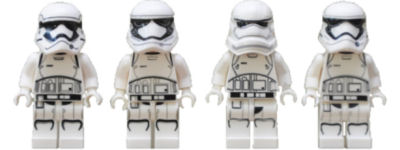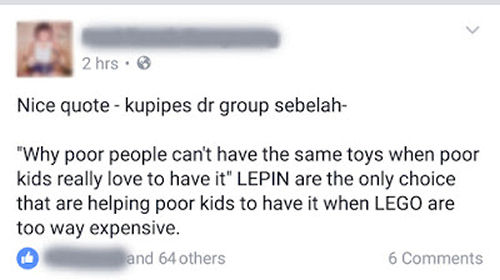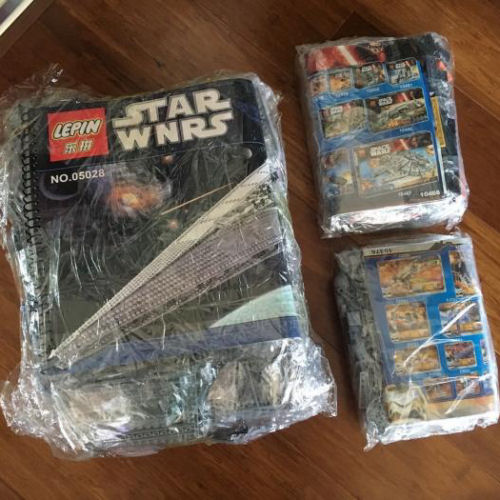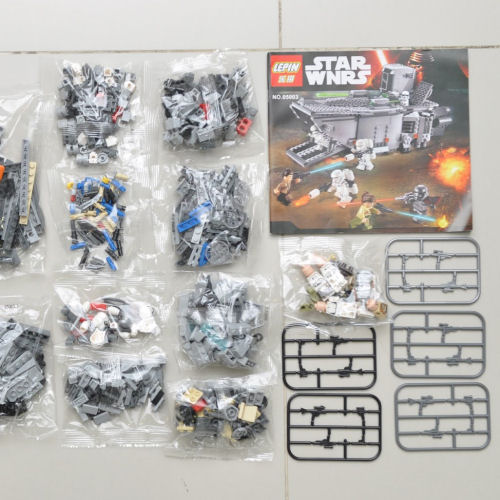
For nearly 20 years Star Wars fans have been building their favorite playsets and ships out of the wildly popular LEGO bricks. Since 1999, the Danish company has made hundreds of cool sets and fun characters from the Star Wars movies and TV shows and earned a huge fan base around the world.
These days some of the sets – particularly the grand Ultimate Collectors Series sets – cannot even stay on the shelves for very long before being snatched up by anxious fans who want the challenge of building the next big thing.
Distributing their sets in countries all over the world eventually lead to small companies, mainly in China, taking notice and start producing their own versions. Most notoriously this was the case with a parent company called MZ Models and their brand of what we know as LEPIN.
LEPIN is well known for reproducing highly valued retired sets and even some mainstream LEGO sets like especially Technic, modular buildings, exclusives and, of course, Star Wars UCS sets. To get in on the community side of the market MZ Models went so far as to create a company which only produces original sets and even takes LEGO Idea submissions and produces copied sets.

LEPIN has also been so on the ball – and sometimes ahead of – with matching the LEGO production cycle that it is presumed LEPIN has an inside source at the LEGO factory in China. With over 25 clone companies currently reproducing brick sets, LEPIN has proven to lead in quality and accuracy in this type of business – going so far as to guarantee no missing parts and even phasing out ABS plastics.
In doing so, collectors and fans have started to take note, and with many popular LEGO Star Wars sets retiring or selling out, companies like LEPIN have become an acceptable alternative.
And because LEPIN doesn’t have to pay license fees, design, marketing or fair wages they are cheap. The LEGO UCS Falcon, for example, reached over $6,000 on the secondary market but you can get the LEPIN version for a fraction of that price.
Some believe it’s a better choice when their kids are going to put their sets together and then just take it apart again. That’s the argument for many Western buyers. In a number of more impoverished regions, especially those where IP enforcement is not a major concern of the law, these clone sets are more common than their legitimate counterparts.

Just like Lucasfilm, Kenner or Hasbro, the LEGO name is a well known brand around the world and it’s evident that a lot of toys come from their inspiration, legal or not. Most of the less known clone companies are small enough not to be noticed easily and often change their names to avoid legal trouble every so often.
Of course, collectors are a little different and tend to be more brand loyal than the average fan who would prefer not to spend that kind of money on a LEGO set for their children. Brand loyalty is good news for LEGO as they will always have a strong fan base who will always buy from them. Surprisingly, however, the loyalty also extends to LEPIN who have a sizeable amount of popular support – even going so far as to have a LEPIN wiki on Reddit and even the legitimate LEGO blog press has taken to reviewing the LEPIN experience from time to time.
Now, this being said, it is not as easy to purchase actual boxed LEPIN brand sets as one may think. LEPIN only sells boxed sets through their retail outlets. Contrary to many beliefs, they do not have an official website nor do they officially distribute their sets on sites like Aliexpress. They sell to resellers who often sell the sets loose in baggies to customers worldwide. These repackaged versions of LEPIN sets are easily identifiable as the quality of parts and packaging can be different from that of an actual LEPIN set. Many resellers don’t include instructions and sticker sheets, and expect you to print off digital versions at your own expense.

And as often as not, what arrives isn’t as convenient to assemble as a bona fide LEGO set. Though a recent quality push by LEPIN to ensure numbered bags are included in the sets they distribute, the dump-it-in-a-bag approach used by many resellers often means that pieces may be packed in a nonsensical way or parts that are normally pre-assembled at a LEGO factory require despruing.

If you are tempted to try a clone brand be aware of what you are ordering, remember to read the fine print and – most importantly – don’t hold LEPIN to the same expectations you would LEGO. With so many people thinking they are getting great deals and saving a lot of money plenty of buyers are coming away disappointed, and the LEGO brand value is getting hurt doubly so.
From a collecting and safety standpoint, LEGO will never not be the top choice for construction sets. High quality bricks, health and environmentally safe materials and top-notch packaging will always be in favor. However, if an affordable display or gift sets of unavailable models is your motive then the secondary market isn’t the only solution – but let the LEPIN buyer beware.
Guest writer Steve Weimer has been a collector of vintage Star Wars toys since a young age. This interest led him to discover bootleg action figures and eventually clone LEGO brands. His research in bootleg bricks has turned up hundreds of variant sets, production artwork and display prototypes.


Be the first to comment